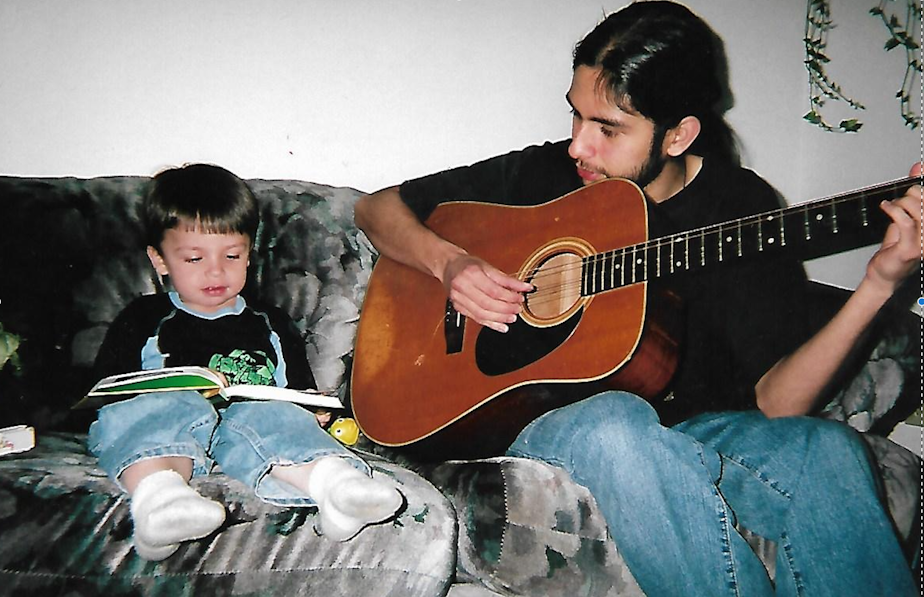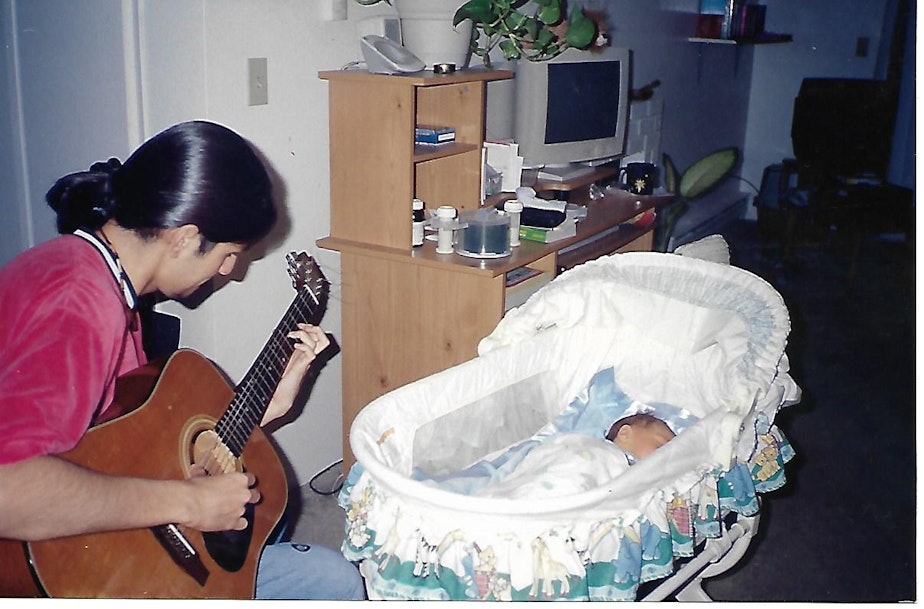How my dad survived teenage immigration with a guitar and a dream

Hugo Guerra grew up in a tough home environment in Guatemala. He used his guitar to cope and help overcome challenges as a teenager. When he immigrated to the United States, his guitar became a tool to survive. RadioActive's Adrian Guerra shares his dad Hugo's story.
[RadioActive Youth Media is KUOW's radio journalism and audio storytelling program for young people. This episode was entirely youth-produced, from the writing to the audio editing.]
M
y dad learned how to play the guitar when he was growing up in Guatemala City. At 13, when he saw his cousin get a guitar for Christmas, he knew he needed one too.
It took his parents a year to save up the money.
"I remember it sounding great," my dad told me. "But I didn't have much of a frame of reference. I also was just starting out, so I wasn't very good."
Life has never come easy to my father. Growing up in the aftermath of a civil war brought challenges that many of us in the United States don’t have to face.
My dad remembers one time when he was being dropped off at school by a friends mother, and a car was following them.
"When they got to my house, they got out of the car and they took us out of that car with guns. Like, 'everybody get out,' and then they stole the car."
Sponsored
He had many moments like that.
Hearing him tell me this story took me aback. It's a massive contrast from the life he’s helped provide for my brother and I. But things like that were just normal for him. Sometimes you don’t realize just how good you have it until you hear something like that.

"Sometimes it's hard for people to understand how you grow up like that," my dad said. "Or sometimes people think that you grow up in constant fear because of that. But I would say that it just becomes a part of your life, of what you have to do."
Sponsored
At 18, when most kids are going off to college or getting jobs, my father left all he knew behind and moved to the US.
But his challenges weren’t fixed overnight. He would work 12 to 14 hour days in restaurant kitchens just to get by. If you’ve ever worked in a restaurant before, you know how tiring that can be. A 12-hour shift is enough to make a normal person want to pass out. But my dad is far from normal.
He told me that if you’re an immigrant in a new country, you just can’t afford to be overwhelmed.
"You might feel it, and yeah a lot of Latinos that I knew felt it as well," he said. "But you don't even think about it, you don't talk about it because you have to continue, there's no other choice.
Sponsored
"It's kind of like [there's] a shark swimming in water...you keep going or you die because you can't breathe."
Music was a kind of meditation to him. It helped his constantly thinking brain take a deep breath.
It connects him now to the young musician from Guatemala that he once was.
Sponsored
"It just engaged a different part of myself," my dad explained. "And that was relaxing as well because at least for a brief moment, you don't think about the stress or the hours you're working, or anything like that. You're just playing an instrument.
"Something about music, you know. I really do feel, like you said, that it is a part of me in some way."
And it's a part of me too.
This story was created in KUOW's RadioActive Online Intro to Radio Journalism Workshop for 15- to 18-year-olds, with production support from Kyle Norris and Meghana Kakubal. Prepared for the web by Morgen White. Edited by Diana Opong.
Sponsored
Find RadioActive on Facebook, Twitter, Instagram, TikTok, and on the RadioActive podcast.
Support for KUOW's RadioActive comes from the Bill & Melinda Gates Foundation Discovery Center.
If you have any feedback on this story, you can email RadioActive at radioactive@kuow.org, or fill out the box below. Reach out. We're listening.



